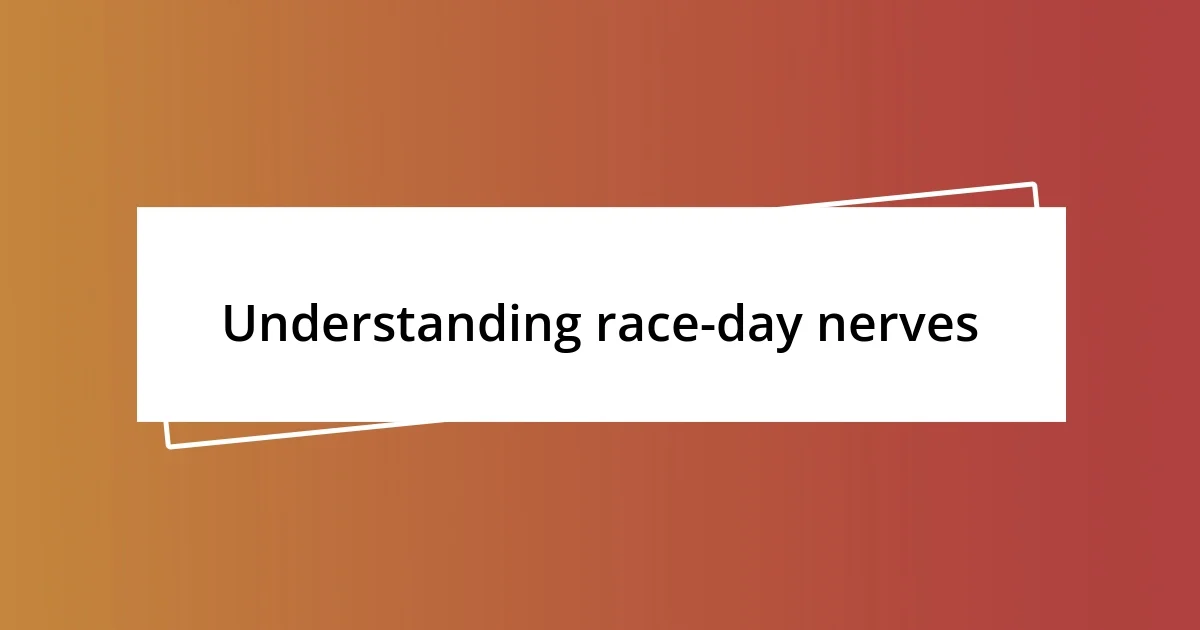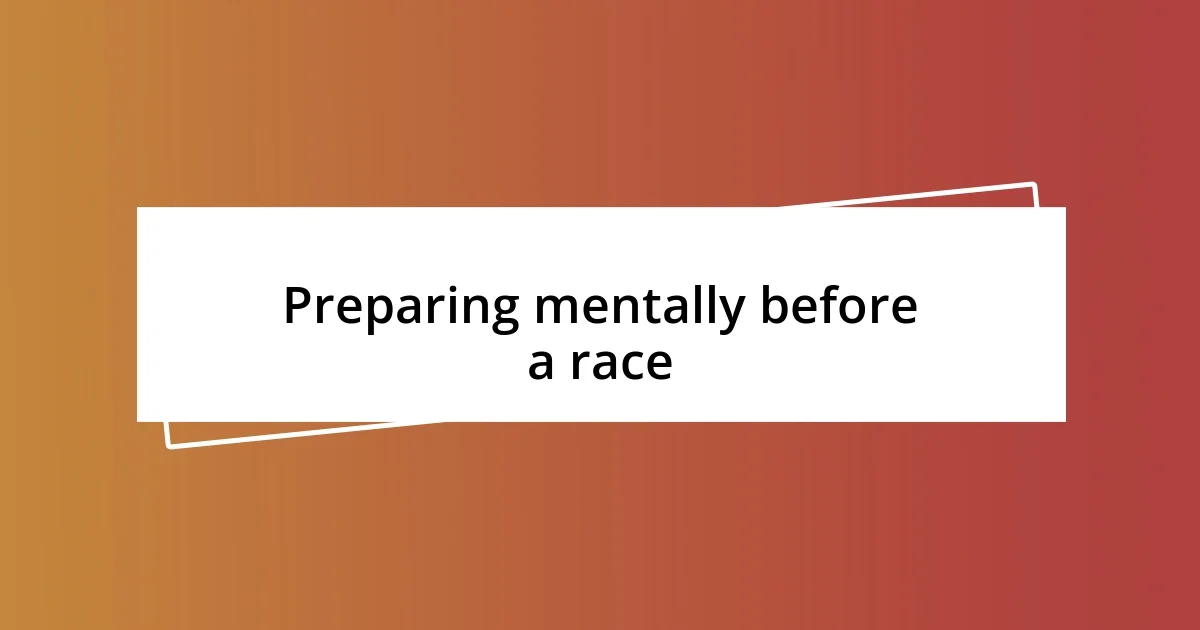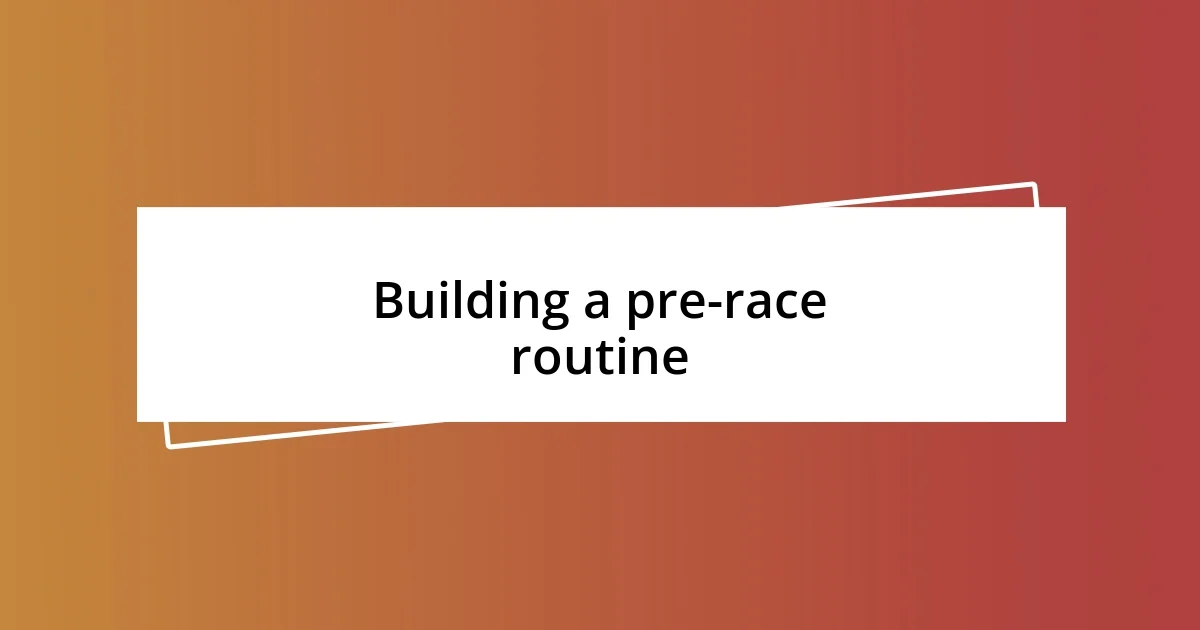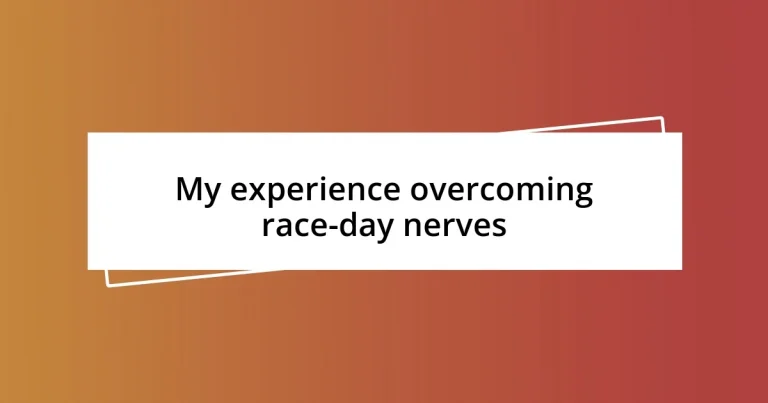Key takeaways:
- Understanding and reframing race-day nerves as readiness can help manage anxiety and enhance performance.
- Mental preparation strategies, such as visualization, positive affirmations, and deep breathing techniques, can significantly improve focus and reduce stress before a race.
- Establishing a consistent pre-race routine, including physical activities and motivational music, helps create a calming environment and turns nerves into excitement.

Understanding race-day nerves
Race-day nerves are a common experience for athletes, often bubbling up as excitement mixed with anxiety. I remember standing at the starting line, heart racing and palms sweaty, feeling like I had forgotten how to breathe. Have you ever felt like all your training might vanish the moment the whistle blows? It’s that overwhelming cocktail of anticipation and fear that can either propel you forward or hold you back.
Understanding these nerves is key to managing them. For me, it’s all about recognizing that this anxiety is merely my body’s way of preparing for the challenge ahead. When I shifted my perspective, viewing those nerves as a signal of readiness instead of a barrier, my mindset began to change dramatically. Don’t you sometimes wish you could talk to that nervous version of yourself and remind them of all the hard work that led to this moment?
At times, the pressure can feel suffocating, but I’ve learned to embrace those nerves as part of the journey. Whether it’s sharing a laugh with fellow competitors or taking a deep breath and recalling past successes, these strategies help ground me. What works for you when you’re on the verge of a big challenge? It’s all about finding that rhythm that allows the nerves to work in your favor rather than against you.

Preparing mentally before a race
Preparing mentally for a race is just as crucial as the physical training we put in. I often find that visualization helps immensely. I close my eyes and picture the course, the finish line, and even the sound of the crowd cheering. This practice calms my mind and sets a positive tone. I remember one race where visualizing my success transformed my nerves into excitement; it felt like I was already crossing that finish line before I even began.
Here are some strategies I rely on to prepare mentally before race day:
- Set clear goals: I always outline what I want to achieve, whether it’s a specific time or simply enjoying the experience.
- Practice positive affirmations: I repeat phrases like “I am ready” or “I can do this” to build my confidence.
- Breathe deeply: Taking a moment to focus on my breath helps clear my mind and reduces anxiety.
- Reflect on past successes: I think about previous accomplishments, reminding myself that I’ve overcome challenges before.
- Embrace the rhythm of the day: Incorporating my usual pre-race routine helps ease my nerves, as it brings familiarity to an otherwise anxiety-inducing situation.
Preparing mentally sets the stage for me to not just race but enjoy the experience as well.

Effective breathing techniques
Effective breathing techniques can be game changers when it comes to managing race-day nerves. I’ve found that focusing on my breath not only calms my mind but also brings my body back into a balanced state. One technique I really enjoy is the 4-7-8 breathing method, where I inhale for a count of four, hold for seven, and exhale for eight. This rhythm, though simple, reminds me to slow down and center myself, especially at the starting line, where anxiety can feel overwhelming.
Another technique I’ve embraced is diaphragmatic breathing, which encourages deeper, more effective breaths. I remember a particularly tense moment before a big race; I wasn’t just nervous, I was almost afraid. By placing a hand on my belly and consciously breathing deeply, I felt my tension melt away. This method not only improved my physical performance but also transformed my mental approach, allowing me to shift from panic to focus.
Incorporating these breathing techniques into my routine has become almost second nature. I often remind myself that when the pressure builds, my breath is my anchor. Have you ever considered how your breath could dramatically impact your mindset? For me, those deep breaths are a reminder of my capability; they ground me in the moment, countering any negative thoughts with clarity and purpose.
| Breathing Technique | Description |
|---|---|
| 4-7-8 Breathing | Inhale for 4 seconds, hold for 7, exhale for 8 to promote calmness. |
| Diaphragmatic Breathing | Focus on deeper belly breaths to reduce anxiety and improve oxygen flow. |

Visualization strategies for success
One visualization strategy that has really stood out to me is creating a mental movie of my race. I vividly picture every detail — the starting gun firing, my feet pounding against the pavement, and the cheering of the crowd pushing me forward. With each rehearsal in my mind, I feel an increasing sense of control over my performance. This not only boosts my confidence but also transforms those pre-race jitters into pure anticipation. Have you ever imagined a scenario so vividly that it felt almost real? It’s like giving yourself a sneak peek of victory before you even step onto the course.
Another effective technique I use is visualizing my ideal self. I picture myself running strong and steady, my form flawless, and my breathing even. I can see how I move with grace and determination. This image is essential on race day when nerves can cloud my reality. By focusing on this empowered version of myself, I am reminded of my abilities and the hard work I’ve put in. It’s fascinating how visualization can align my body and mind, merging them into a single purpose as I approach the start line. Have you harnessed the power of seeing your best self? For me, it’s like wearing armor against doubt.
Finally, I always visualize challenges I might face during the race, like fatigue or tough mental spots. By preemptively seeing how I’ll tackle these hurdles — taking a deep breath, shifting my focus, or drawing upon previous victories — I equip myself with strategies to push through. Just last month, during a particularly demanding race, my visualization practice kicked in when I hit a wall at mile 10. Instead of panicking, I remembered my mental preparation and shifted my focus to the finish line ahead. It was a reminder of just how powerful our minds can be in shaping our outcomes. What strategies do you deploy when facing mental challenges?

Positive self-talk and affirmations
Positive self-talk is like a secret weapon I’ve harnessed before race day. As I stand on the starting line, I repeat phrases like “I am prepared” and “I can do this.” It’s empowering — transforming anxiety into excitement. I remember one race where, despite feeling the pressure, repeating those affirmations turned my dread into determination. Have you ever caught yourself saying negative things before a big challenge? Shifting that inner narrative can be a game changer.
Affirmations aren’t just feel-good phrases; they genuinely shift my mindset. For instance, I often remind myself, “Every step is progress.” This simple statement helps me focus on the journey rather than the finish line’s overwhelming enormity. I recall a race where I stumbled around mile three, and instead of fixating on my mistake, I repeated that affirmation, allowing me to regain my rhythm and energy. Isn’t it fascinating how our thoughts can directly influence our performance?
Incorporating these affirmations regularly can foster a resilient mindset. I like to write them down and place them where I can see them during training. It creates a little ritual that primes me for success. One time, before a significant marathon, I pasted a post-it on my mirror that said, “I am strong, I am capable.” Each time I read it, I could feel my confidence build. Have you tried using written affirmations? For me, that visual reminder of my strength is invaluable, especially when nerves kick in. When I face doubt, I turn to those written words like a lifeline.

Building a pre-race routine
Building a pre-race routine is crucial for taming those pesky nerves. I’ve found that establishing a consistent ritual before each race can set a calming tone. For me, this often starts the night before with a light meal, ensuring I get a good night’s sleep. The next morning, I stick to the same breakfast to avoid any surprises that might throw off my stomach. Doesn’t having a routine make everything feel more manageable?
I like to incorporate both physical and mental components into my pre-race vibe. Stretching gently reminds me to check in with my body, while deep breathing helps harmonize my thoughts. It helps me find a moment of serenity amidst the chaos. I vividly remember one race when I saw other runners pacing anxiously. I focused on my breathing instead, and it completely shifted my mindset. Have you ever tried simply being present in those moments before the race?
One thing that truly adds a spark to my pre-race routine is listening to my favorite music. Curating a playlist with upbeat tracks gets my heart pumping and fills me with energy. I recall an exhilarating moment just before a half marathon when my song came on, and I felt a wave of confidence wash over me. It’s fascinating how music can tap into our emotions and inspire us. What’s your go-to song that gets you fired up? Adding such personal touches to your routine can create an environment where nerves transform into electrifying excitement.














